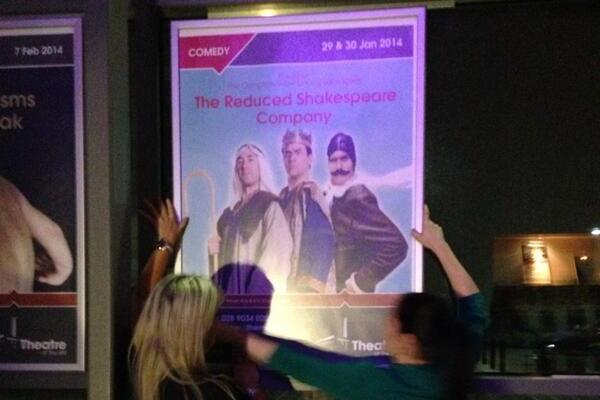Index relies entirely on the support of donors and readers to do its work.
Help us keep amplifying censored voices today.

Staff at Newtownabbey’s Theatre on the Mill return promotional posters to hoardings after the local council overturned a ban on the Reduced Shakespeare Company’s The Bible (Abridged). Image Conor Macauley/Twitter
Do we have the right to not be offended?
Newtownabbey council said “yes” when they cancelled what they labelled a blasphemous play, The Bible: The Complete Word of God (Abridged), due to be performed by the Reduced Shakespeare Company (RSC) earlier this year. Members of the Democratic Unionist Party (DUP), a political party with roots in the Free Presbyterian Church, called for the show to be axed fearing it would offend and mock Christian beliefs.
The story went global as accusations of censorship were hurled at the Northern Irish council. Twitter exploded with satirical cartoons of the DUP, petitions against the ban and the hashtag #thoushaltnotlaugh. Days later, the decision was reversed.
Some members of the public agreed with the move to cancel The Bible, but they represented a minority. Many argued that the DUP’s original decision amounted to censorship and asked what qualified them to act as censor. Fear of a public backlash from offended parties might motivate councils and theatres to make these kinds of decisions, but who has the right to judge who is and who isn’t entitled to free speech?
Under threat of a ban, The RSC, however, didn’t feel that their free speech had been limited; the real victims were the people of Newtownabbey who had their freedom of choice taken away from them. In a post show talk after the opening night, the company told the audience, ‘You were excited because you were allowed to go and see the show you wanted to see.’ If people felt the show would offend them, they had the choice to stay at home or see the show and make their own judgement. The DUP’s original decision would have eliminated this choice and sent a message that the public are unable to think for themselves.
In the RSC’s podcast, Austin Tichenor described how the first two performances of the show, ‘were cancelled over complaints about the production by people who had never seen it or read it.’ The DUP and some members of the Christian community jumped to the conclusion that The Bible was poking fun at Christianity. As it so happens, the RSC’s production The Bible is not intended to cause offence or mock Christianity, but is a celebration of the religious text. Tichenor tweeted, “Our script celebrates the Bible. I disagree with how many churches interpret it, but have never once called for them to be censored” and later added, “Honestly, NI folks are going to finally see BIBLE (abridged) and go, ‘THIS is what all the fuss was about?’’
With the knowledge that the play is a comedy about the Bible, some individuals presumed that the content must be offensive and blasphemous. Whether it is or isn’t offensive is not the point – everyone is entitled to their view, it doesn’t matter whether they’re right. It just so happens that on this occasion a fuss was made for no reason. The events in Newtownabbey just go to show how easily theatre can be suppressed and how individuals can take it upon themselves to save others from the burden of being offended.
Theatre censorship in the UK was abolished in 1968, after a history of “offensive” material being suppressed and censored. Although officially British theatre is not censored, this doesn’t stop pressure from groups and individuals when contentious issues are raised in plays, in this case a religious group. Are religious leaders too ready to appoint themselves as censors? With the case of Newtownabbey, religion and politics became one voice, distorting whether this was a political matter or a case of religious opinion.
Religions are based on sets of ideas and so mustn’t be above scrutiny. For these groups to develop, attract more members and function within society, their ideologies must be debated and discussed. The best practise perhaps is not for religious groups to suppress criticism, but to embrace and respond to it. The very nature of religion is that leaders will advise their followers how to act and lead their lives, but going so far as to ban a play crosses the line into censorship.
With the knowledge that some religious groups are ready and willing to suppress supposedly blasphemous theatre, is there a culture of self-censorship within playwrights? What of the plays that were imagined, but never existed for fear of causing offence? The events at Newtownabbey have shown a religious group attempting and failing to act as censor when the public voiced their own opinions. What this story has shown, is that whilst there may be threats to our freedom of speech, our right to reject and protest against these decisions is still very much in place and evidently extremely effective.
This article was originally posted on 1 May 2014 at indexoncensorship.org